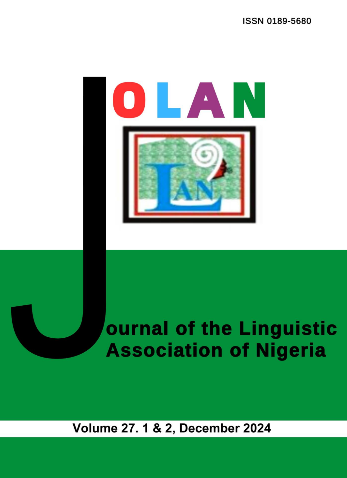Acoustic Evidence for a Tonal Negative Marker in Ẹdo
Keywords:
Ẹdo language, Morphophonology, Negation, Acoustics, PhonosyntaxAbstract
This paper investigates an aspect of negation in Ẹdo language, using primary data obtained from native speakers. Three overt morphemes: í, má, and ghẹ have been identified as markers of negation in the language. This study focuses on negative utterances which lack the í-morphemes in overt realizations. The utterances were extracted and analysed with PRAAT 6.0.30. Data analyses reveal that negative constructions which lack an overt marker typically contain underlying í-marker which can be deleted. The high tone it bears is left to float regressively or progressively, depending on the morphophonological environment. In cases deletion is suspended, vowel height reduction applies, in which case, the segment of the negative morpheme changes from a tense to a lax vowel. Since tone is observed to be used to negate utterances in Ẹdo, the study concludes that it should be recognized as a strategy for negation in the language.
References
Agheyisi,R. N. (1986) An Ẹdo – English Dictionary. Benin City: Ethiope Publishing.
Ajayi, T. M. and Tella, S. A. (2014) “Negative markers in Akure and standard Yoruba: a contrastive analysis.” In Taiwo O. & A. Olayiwola (Eds.). Globalising the Local: African Languages and Cultures at the Border of Technology. Ibadan: Crown Goldmine Communications Ltd
Alerechi, R. I. C. (2015). “Negation in the Omuanwa dialect of Ikwere”. In Ndimele O.-M. (ed.), Language Endangerment: Globalization & the Fate of Minority Languages in Nigeria. A Festschrift for Appolonia Uzoaku Okwudishu, Port Harcourt: Grand Orbit Communications & Emhai Press, 527-546.
Crystal, D. (2008) A Dictionary of Linguistics and Phonetics. Malden MA: Wiley-Blackwell
Elugbe, B. (1989) A Comparative Edoid: Phonology and Lexicon. Port Harcourt: University of Port Harcourt Press.
Greenberg, J. H. (1966) The Languages of Africa. The Hague: Mouton
Hyman, L. (1979) “A Reanalysis of Tonal Downstep.” Journal of African Language and Linguistics, 1, 9 – 29.
Imasuen, E.O.(1996) Ẹdo Course for Schools & Colleges, BookI. Benin-City: Aisien Publishers
Imasuen, E. O. (1997a) Ẹdo Course for Schools and Colleges, Book IV. Benin City: Aisien Pub.
Imasuen, E. O. (1997b) Ẹdo Course for Schools and Colleges, Book V. Benin City: Aisien Pub.
Ndimele, O-M. (1995) “On the Phonological Dimension of Negation.” In Emenanjo E.N.and OM. Ndimele (Eds.). Issues in African Languages and Linguistics: Essays in Honour of Kay Williamson. Aba: NINLAN Book Series, 101-116
Ọmọrẹgbẹ, E. (2012). The Basic Clause: A morpho-syntactic Analysis. Ph.D Dissertation, Univ. of Benin, Benin City.
Ọmọregie, O. S. B. (1983) Ẹdo grammar for schools and colleges. Lagos: Thomas Nelson (Nigeria) Limited
Omoruyi T. O. (1989) “Negation in Ẹdo.” Afrikanistische Arbeitspapiere 19, 127-146
Omozuwa, V. E. (2003) “Edo Orthography Revisited.” In Ndimele O. (Ed.) Four Decades in the Study of Languages and Linguistics in Nigeria: A Festchrift for Kay Williamson. Aba: National Institute for Nigerian Languages, 313 – 319.
Omozuwa, V. E. (2007) “Misspellings in Edo Names: A Case for a Standardized Orthographic Reform.” Nigerian Journal of the Humanities, No. 14, 156 – 170.
Omozuwa, V. E. (2010) Edo Phonetics and Phonology. Benin City: AMBIK Press.
Yuka, L. C. & Osímẹ, I. I. (2006) Negation Strategies in Lamnso’. In Egbokhare F. O.& C. O. Kolawole (Eds.) Globalisation and the Future of African Languages, Ibadan: Ibadan Cultural Studies Group, 334-348.
Yuka, L. C. & Adefabi, F. (2016) “The LTS and Polarity in Súpárè Negated Clauses”. In O. Taiwo. & L. C. Yuka (Eds.) New Findings in West African Languages and Literature, Ibadan: West African Linguistics Society, 38-46.














